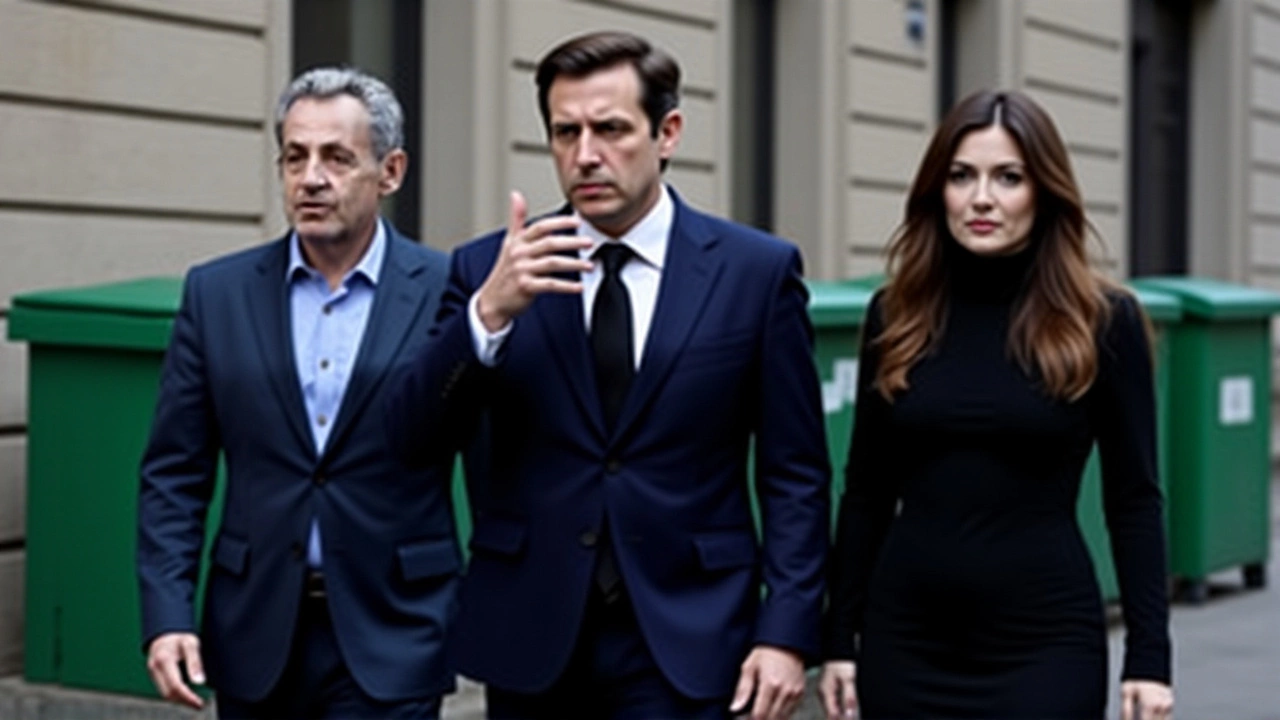When Nicolas Sarkozy, former President of France (2007‑2012), walked through the gate of La Santé Prison on , the nation sensed a seismic shift in its political terrain. The 70‑year‑old former head of state was sentenced to five years for a criminal conspiracy that tied his 2007 campaign to the late Libyan ruler Muammar Gaddafi. The move marks the first time a democratically elected French president has been incarcerated since the post‑World War II era, sending ripples through every corner of the Fifth Republic.
Background: The Gaddafi Funding Allegations
The saga began in 2013 when the Parquet National Financier opened an investigation (case PNF 13‑192) into claims by French‑Lebanese businessman Ziad Takieddine that the Libyan regime had funneled €50 million into Sarkozy’s 2007 bid. At the time, Sarkozy led the Union pour un Mouvement Populaire (UMP), a right‑wing party headquartered on Rue de Vaugirard. The alleged cash‑for‑politics deal was said to have been coordinated through intermediaries, including former chief‑of‑staff Claude Guéant and lawyer Thierry Herzog.
The Conviction and Sentencing
After a protracted trial that stretched from late 2024 into the summer of 2025, the Paris court found Sarkozy guilty of "complicité de violation du secret de l'instruction" under Article 432‑10 of the French Penal Code. The verdict, handed down on , was upheld by the Cour de Cassation on . He was ordered to serve a five‑year term, with a mandatory one‑third portion—about 20 months—before any parole eligibility.
The Day of Incarceration
At roughly , Sarkozy left his 17 Avenue Foch residence in the 16th arrondissement, escorted by a contingent of police officers. He was trailed by his wife, Carla Bruni‑Sarközy, the Italian‑French singer‑songwriter and former model, who wore a beige coat and kept a steady hand on his arm. Around 75 supporters—members of the successor party Les Républicains—gathered outside, waving tricolour flags and chanting "Liberté pour Nicolas."
During the short drive to the prison, Sarkozy posted a terse message on X (formerly Twitter): "It is not a former president of the republic being jailed this morning, but an innocent man. I have no doubt. The truth will prevail," timestamped . The tweet echoed his courtroom declaration from September, where he told the judge, "If they absolutely want me to sleep in prison, I will sleep in prison – but with my head held high."
Reactions from France’s Political Landscape
Within hours, the ruling coalition expressed a mixture of condemnation and caution. Prime Minister Élisabeth Borne, speaking from the Élysée, said, "The rule of law applies to every citizen, regardless of former titles." Opposition leaders from Les Républicains accused the judiciary of politicisation, organising a rally in Marseille that drew a crowd of 1,200.
Legal experts were swift to weigh in. Professor Étienne Picard of Panthéon‑Assas University noted, "Sarkozy’s incarceration sets a precedent for accountability of former heads of state under Article 68 of the Constitution." Meanwhile, political scientist Pascal Perrineau of Sciences Po warned of "potential voter erosion for the right‑wing bloc ahead of the 2027 presidential election."
Legal and Financial Fallout
Beyond the prison cell, the verdict triggers tangible repercussions. The Ministry of Justice, overseen by Director General Yves Le Marec, ordered the suspension of Sarkozy’s €6,289.50 monthly presidential pension for the duration of his term. His book royalties—approximately €200,000 a year—remain untouched, as French law treats literary income separately.
Market watchers noted a modest 2.3 % dip in Havas Group shares on the Euronext‑Paris exchange between 21 and 22 October, reflecting investor unease over the former president’s post‑presidential business ties. The Bygmalion case, concerning alleged illegal spending in Sarkozy’s 2012 re‑election campaign, continues to simmer, with a preliminary hearing slated for 30 November 2025.
What Lies Ahead
Next week, the former president will undergo a mandatory medical check‑up at La Santé, scheduled for . He will then be assigned to daily work duties, as required by Article D24‑8 of the French Prison Administration Code.
The appeal before the Cour de Cassation is set for , with a decision expected by the end of March. Regardless of the outcome, the case has already reshaped the dialogue around political immunity and the reach of anti‑corruption measures in France.
Frequently Asked Questions
How does Sarkozy’s imprisonment affect the Les Républicains party?
The party faces a credibility crisis, with polls showing a 5‑point dip in support since the sentencing. Senior figures are scrambling to distance themselves from the scandal while avoiding factional splits that could weaken their 2027 presidential hopes.
What legal avenues remain for Sarkozy after his appeal?
Beyond the Cour de Cassation, Sarkozy could petition the European Court of Human Rights if he argues procedural violations. However, French courts have repeatedly affirmed the lower‑court findings, making a reversal unlikely.
Will the suspension of his pension set a legal precedent?
Yes. French law typically protects former presidents’ pensions, but the suspension demonstrates that criminal convictions can override that protection, potentially influencing future cases involving high‑ranking officials.
How did the market react to the sentencing?
Shares of Havas Group, a former employer of Sarkozy, slipped 2.3 % on the Paris exchange the day after the news. Analysts cited uncertainty over possible investigations into corporate lobbying linked to the former president.
What does this case mean for future campaign‑finance rules in France?
Legislators are now pushing for stricter transparency mandates and harsher penalties for foreign money in elections. The Sarkozy verdict has become a rallying point for reformers seeking to close loopholes exposed during the Gaddafi funding investigation.
